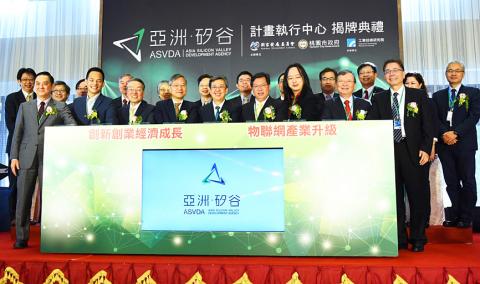Vice President Chen Chien-jen (陳建仁) on Sunday inaugurated the base for the implementation of the government’s “Asian Silicon Valley” project, which is designed to improve the nation’s overall economic structure.
The major tasks of the Executive Center for the Asian Silicon Valley Plan in Taoyuan are to promote the Internet of Things (IoT) and innovative industries, boost economic development by integrating local and international sectors, and push industrial transformation, Chen said at the ceremony.
The opening is the first step for the executive center, from which Taiwan intends to bring together talent in innovation from around the world, making them into the power driving Taiwan’s industrial upgrade and transformation, Chen said.

Photo: Lee Jung-ping, Taipei Times
The center is in a financial building in front of the Taoyuan High Speed Rail Station in Jhongli District (中壢).
Chen said the new facility is expected to develop Taoyuan into the engine for Taiwan’s economic development.
The plan was not formed to make a Taiwanese copy of Silicon Valley in California, “but to encourage Taiwanese industries to have the spirit of innovation,” Chen said.
According to the National Development Council, which drafted the Asian Silicon Valley implementation plan, it consists of “one ecosystem,” “two objectives,” “three links” and “four strategies.”
The ecosystem means the formation of a cluster of innovative start-ups with a heavy focus on research and development (R&D), while the two objectives include one to foster the ecosystem and another to promote innovative R&D for IoT industries, the council said. The three links means joining local industries to connect Taiwan to the world and build links to the future.
As for the four strategies, they are the concrete steps the government will take to tie Taiwan to Silicon Valley and other global technology clusters, turning the nation into an innovative start-up destination for young Asians and creating new industries for the next generation, it said.
The implementation strategies include creating a robust start-up and entrepreneurship ecosystem by cultivating innovative talent, providing business expansion capital and adjusting laws to create a friendlier environment for start-ups; establishing a one-stop service center to integrate the R&D capabilities of Silicon Valley and other global innovation clusters; integrating Taiwan’s hardware advantages into software applications; and establishing a quality Internet environment, it said.
The plan’s implementation period will run through 2023, the council said.
A budget of NT$11.3 billion (US$350.4 million) has already been allocated for next year for Internet infrastructure, mobile broadband services, e-commerce, smart applications, industry-university collaboration, test beds, digital talent and regulatory adjustment, the council said.
Projecting the combined effect of the Asian Silicon Valley plan and other digital economy plans, the council said it expects Taiwan’s IoT global market share to climb from 3.8 percent last year to 4.2 percent by 2020 and to 5 percent by 2025.
Premier Lin Chuan (林全) has said that the aim of the plan is to improve the nation’s overall economic structure.
The Asian Silicon Valley initiative is similar in nature to the Industry 4.0 movement taking hold around the world and is one of five innovative industries upon which President Tsai Ing-wen (蔡英文) has vowed to focus, Lin said.
Four other innovative industries the Tsai administration has designated as the core of Taiwan’s economy are “smart” machinery, “green” technology, biomedical technology and national defense.

Taiwan is to commence mass production of the Tien Kung (天弓, “Sky Bow”) III, IV and V missiles by the second quarter of this year if the legislature approves the government’s NT$1.25 trillion (US$39.78 billion) special defense budget, an official said yesterday. Commenting on condition of anonymity, a defense official with knowledge of the matter said that the advanced systems are expected to provide crucial capabilities against ballistic and cruise missiles for the proposed “T-Dome,” an advanced, multi-layered air defense network. The Tien Kung III is an air defense missile with a maximum interception altitude of 35km. The Tien Kung IV and V

The disruption of 941 flights in and out of Taiwan due to China’s large-scale military exercises was no accident, but rather the result of a “quasi-blockade” used to simulate creating the air and sea routes needed for an amphibious landing, a military expert said. The disruptions occurred on Tuesday and lasted about 10 hours as China conducted live-fire drills in the Taiwan Strait. The Civil Aviation Administration (CAA) said the exercises affected 857 international flights and 84 domestic flights, affecting more than 100,000 travelers. Su Tzu-yun (蘇紫雲), a research fellow at the government-sponsored Institute for National Defense and Security Research, said the air

Taiwan lacks effective and cost-efficient armaments to intercept rockets, making the planned “T-Dome” interception system necessary, two experts said on Tuesday. The concerns were raised after China’s military fired two waves of rockets during live-fire drills around Taiwan on Tuesday, part of two-day exercises code-named “Justice Mission 2025.” The first wave involved 17 rockets launched at 9am from Pingtan in China’s Fujian Province, according to Lieutenant General Hsieh Jih-sheng (謝日升) of the Office of the Deputy Chief of the General Staff for Intelligence at the Ministry of National Defense. Those rockets landed 70 nautical miles (129.6km) northeast of Keelung without flying over Taiwan,

A strong continental cold air mass is to bring pollutants to Taiwan from tomorrow, the Ministry of Environment said today, as it issued an “orange” air quality alert for most of the country. All of Taiwan except for Hualien and Taitung counties is to be under an “orange” air quality alert tomorrow, indicating air quality that is unhealthy for sensitive groups. In China, areas from Shandong to Shanghai have been enveloped in haze since Saturday, the ministry said in a news release. Yesterday, hourly concentrations of PM2.5 in these areas ranged from 65 to 160 micrograms per cubic meter (mg/m³), and pollutants were